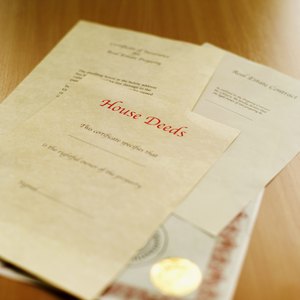
You can add a name to a deed for a house. It is a fairly straightforward and simple matter. A husband can add his wife or a wife can add a husband. Not having a mortgage makes it even easier. A deed is the legal document that transfers title to a house, or in this case, adds another owner. The addition of a new owner does create consequences going forward.
Ownership Changes
Adding your wife to the deed requires selection of an ownership type. Tenancy by the entirety, permissible in some states, is essentially joint tenancy with right of survivorship. At the death of the first spouse, the surviving spouse inherits the house.
Tenancy in common, another type of joint ownership, means each spouse controls one-half of the house and can control its ownership after death by means of a will. State law specifies the legal language to create each ownership type, so having an attorney prepare the deed ensures that the wishes of the husband and wife are met.
Check for Liens
Liens for unpaid debts, judgments and taxes automatically attach to real property. Any such lien in the name of the wife will become a lien against the house once her name is put on a deed and recorded. Make sure your wife does not have any recorded liens before filing the deed. If any encumbrances exist, they need to be paid and cancelled of record so the title to the house is not affected.
Marital Property
Adding your wife to the deed converts the property from separate property to marital property in some states. The law treats the deed as a gift with the wife now owning one-half of the house. The husband now needs the consent of his wife to mortgage or sell the house. The property is subject to division as part of any divorce proceeding with the assumption each party owns one-half.
Future Considerations
The financial state of your wife now become relevant to events such as a new mortgage or an equity loan. Her credit report and score may have implications for obtaining that loan. Any sale of the home will require her approval. If she decides to open a business and it has financial problems, those problems may result in liens against the home. An example would be unpaid employment taxes to the IRS that result in a federal tax lien. Although the husband is not personally liable for the taxes of his wife, the IRS can pursue the wife's interest in the house.
References
Writer Bio
Robert Alley has been a freelance writer since 2008. He has covered a variety of subjects, including science and sports, for various websites. He has a Bachelor of Arts in economics from North Carolina State University and a Juris Doctor from the University of South Carolina.

